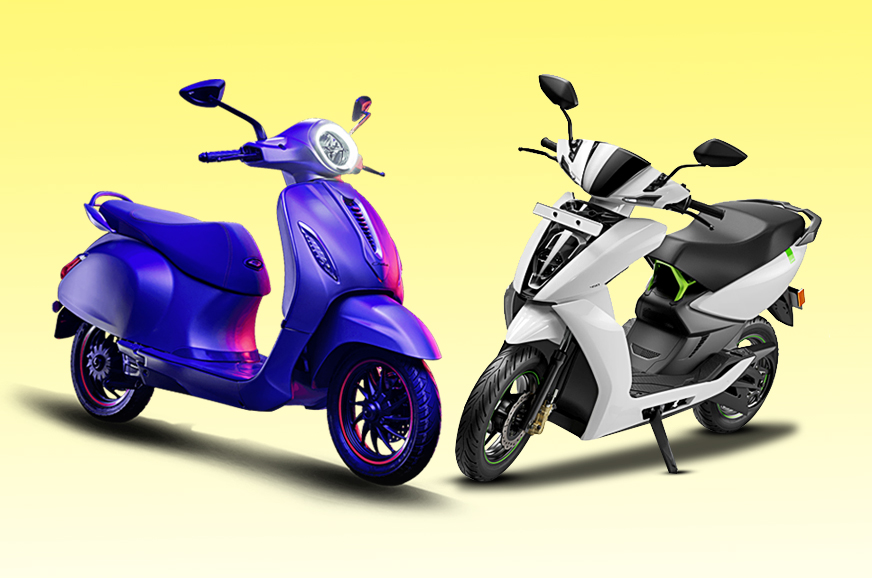
The newly launched electric Bajaj Chetak is the first electric two-wheeler from a mainstream manufacturer. The Chetak boasts some interesting specifications and features, and the only other scooter that's a direct rival to it is the Ather 450.
Well, Ather apparently thinks so too, as it sent out a side-by-side comparison of what both the bikes offer. We decided to break them down too, so here’s how two of the most promising electric scooters in our market stack up against each other on paper.
Availability, price, and variants
The Chetak will be retailed via select existing KTM dealerships, but it's only available in Bengaluru and Pune currently. Bookings will open on January 15, 2020, and can be made via the Chetak website, with the booking amount set at Rs 2,000. Deliveries will begin by the end of February. Bajaj has revealed that the e-scooter will be available in two variants – Urbane (Rs 1 lakh) and Premium (Rs 1.15 lakh). We’ll have to wait to see how factors like the FAME subsidy will affect the on-road pricing of the scooter.
Ather too isn’t very different in terms of availability and price. Currently, the 450 is available only in the company's home city of Bengaluru, where it costs Rs 1.13 lakh, and in Chennai where buying one will set you back Rs 1.22 lakh (both prices, on-road). The company also recently revealed that it was working on a more premium version of the 450 called the 450X, and it will offer better performance, more features, and multiple colour options.
Both manufacturers are in the process of expanding their reach across the country, but considering the wide network of pre-existing KTM dealerships, it should be easier for the Bajaj Chetak to reach multiple cities.
Battery and performance
Bajaj has revealed that the Chetak employs a motor with a peak power of 4.08kW and a continuous output of 3.8kW. The Ather's motor, on the other hand, has a higher peak output of 5.4kW but a lower continuous power output of 3.3kW. It, however, produces more torque – 20.5Nm in comparison to the Chetak's 16Nm.
The 450 also has a higher top speed of 80kph, while Bajaj tells us that the Chetak has been limited to a top speed of 60-65kph. What these numbers indicate, at the very least, is that the Chetak’s motor can produce a higher power output continuously without any significant heating issues. We’ve tested the Ather for its performance, and you can take a look at the numbers here.
Both e-scooters use fixed battery packs: the Ather uses a smaller 2.7 kWh unit, while the Chetak uses a 3kWh unit. On a full charge and in its most efficient mode, the Ather is capable of a range of around 75km, while the Chetak will take you as far as 95km. It's the Bajaj that's also quicker to a full charge – a claimed 5 hours compared to the Ather's 5 hours and 30 minutes. Having said that, Ather is working on setting up Ather Grid – a fast-charging infrastructure that will allow you to charge your scooter at a nearby coffee shop or at the mall. The company also tells us that the fast-chargers should give you 1km of usage for every minute charged. The Chetak, on the other hand, can be charged only via the supplied charging cable.
| Battery and performance | ||
| Bajaj Chetak | Ather 450 | |
| Motor Power (Continuous/Peak) | 3.8kW/4.08kW | 3.3kW/5.4kW |
| Torque | 16Nm | 20.5Nm |
| Top Speed | 60-65kph | 80kph |
| Range | 95km | 75km |
| Gradeability | NA | 18 degrees |
| Battery Capacity | 3kWh | 2.7kWh |
| Charging time (0-100%) | 5 hours 30 mins | 5 hours |
| Ride Modes | 3 (Eco, Ride, Sport) | 2 (Eco, Sport + Intuitive kickdown mode) |
Features
Both scooters offer a host of smart features. The Chetak gets a round, simple-looking LCD display that merges into its retro design quite well. But don’t be deceived by its appearance because it does have a fair amount to offer; the unit is smartphone compatible and you can access it via an app. The app gives you access to navigation, tracking features, vehicle and battery statistics, and safety features like if there's an alteration in the charging or if the vehicle is moved when locked.
These features, however, are eclipsed by what the Ather 450 has to offer. It boasts a 7.0-inch capacitive touchscreen that is rated IP65 (protection from dust as well as protection from low-pressure water jets). There's a drop-down menu that lets you see settings and rider insights, navigation and a reverse park-assist feature (the Chetak also gets a reverse mode).
What is interesting is that Ather collects location and riding style information – including GPS data through an internet-enabled, pre-installed SIM card – from every scooter to improve its development. The Bajaj Chetak offers a data subscription service and the first year will be free for customers.
Summing it up
The Ather 450 comes from a rapidly growing start-up, while the Chetak is well, from Bajaj, one of the largest two-wheeler manufacturers in the world. The two, however, are undoubtedly the most advanced electric scooters to be designed, developed and manufactured in India. On paper, the Ather is the smarter, more technologically equipped scooter, and it also appears to be the better performing one. But the Chetak does boast more range, and the fact that it could be sold in multiple cities does give it an advantage over Ather that needs to set itself up from scratch.
To find out which is the better scooter in the real world, we’ll simply have to ride them back to back. Stay tuned.
from Autocar India - Bikes https://ift.tt/2NrUSEw
via YouCabri

No comments: